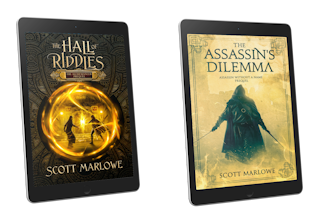 Accessing the full text of books online is nothing new. One can peruse the digital shelves of such sites as the World Digital Library, the International Children's Digital Library, the University of Pennsylvania's Online Books Pages, or even The New York Public Library, which is working with Google Books to offer a searchable subset of their collection online.
Accessing the full text of books online is nothing new. One can peruse the digital shelves of such sites as the World Digital Library, the International Children's Digital Library, the University of Pennsylvania's Online Books Pages, or even The New York Public Library, which is working with Google Books to offer a searchable subset of their collection online.
Therein, though, lies the kicker: these so-called digital libraries are incomplete. Though a somewhat quick perusal of the NYPL's online catalog was impressive, the fact that they maintain an "e" catalog separate from the main one tells me their digital collection differs from what you might find by walking into the actual library.
That might be true of the NYPL, but not so for the library of Cushing Academy. You see, Cushing is going digital, all-the-way:
This year, after having amassed a collection of more than 20,000 books, officials at the pristine campus about 90 minutes west of Boston have decided the 144-year-old school no longer needs a traditional library. The academy’s administrators have decided to discard all their books and have given away half of what stocked their sprawling stacks - the classics, novels, poetry, biographies, tomes on every subject from the humanities to the sciences. The future, they believe, is digital.
The school's headmaster, Dr. James Tracy, is leading this effort. Dr. Tracy believes that printed books are "outdated technology, like scrolls before books".
In place of their traditional library, they are spending $500,000 to create an all-new "learning center". Upon entering this new facility, students will no longer see rows and rows of books, but instead will find:
- three large flat-screen TVs that will project data from the Internet (at a cost of $42,000 these are obviously Dallas Cowboys-sized screens)
- special laptop-friendly study carrels (at a cost of $20,000)
- a coffee shop ($50,000) that will include a $12,000 cappuccino machine
- 18 electronic readers ($10,000) made by Amazon.com and Sony
(No, I did not make those dollar figures up)
I'll put aside the discussion of why they're turning hallowed reading ground into a social mecca with televisions and coffee shops to instead focus on the switchover of their printed material to an all digital library. There's no doubt the world is going digital more and more, so it's not surprising to see this happen. Convenience, accessibility, sheer breadth of titles are all good reasons for this. Also, as technology for digital readers continues to evolve, and as the readers themselves become more affordable, we'll continue to see growth in the e-book space. But will we ever reach the point where physical libraries either do not exist or exist exclusively as meeting places for people who share a common desire to learn (while sipping coffee made by a $12,000 cappuccino machine, of course)?
I have to say that personally I really have nothing against an all-digital world. While I continue to read printed books daily, I haven't set foot in a library since I graduated college. In fact, as I was performing some research for this post, I became impressed enough with the NYPL's digital catalog that I might sign up for a library card (or is it library e-card?) as soon as I'm done here. One of the most amazing aspects of this is that I don't live anywhere near New York, nor will I ever have to set foot into their library to take advantage of their catalog.
At some point, I plan to buy a Kindle or similar e-book reader. At that time, I may very well never buy another printed book again. You can bet that as successive generations become more familiar with e-Ink than the kind that comes from a printing press, that the perception of what a book is will change.
So, too, then will libraries.

Join my reader's group and get The Hall of Riddles (An Alchemancer Prequel) and The Assassin's Dilemma (An Assassin Without a Name Prequel) as a welcome gift.